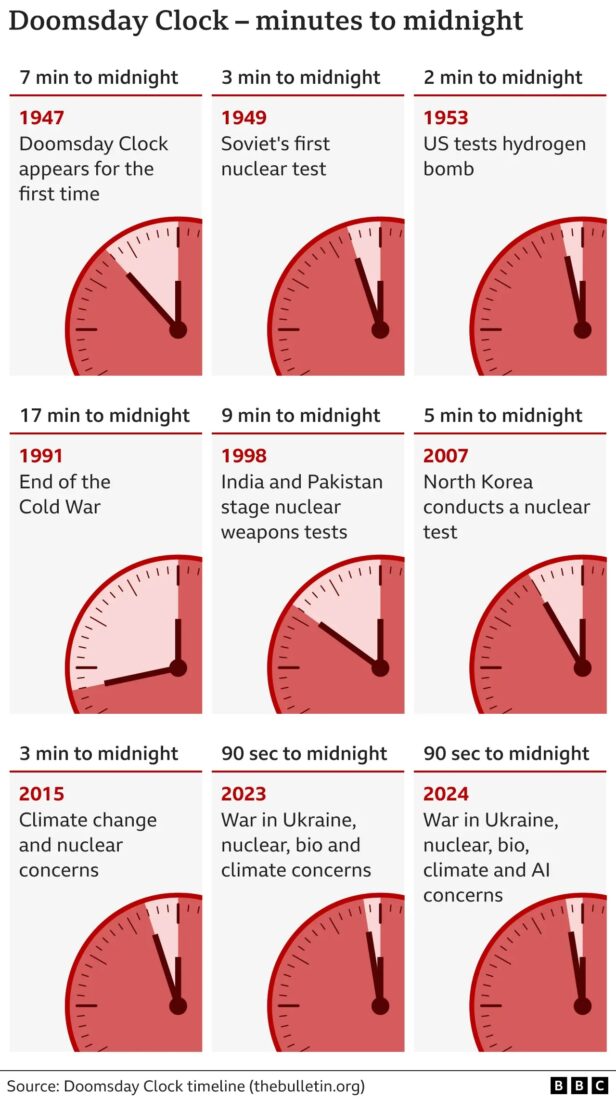 (Source: SecurityInfoWatch.Com)
(Source: SecurityInfoWatch.Com)
My last blog focused on combining the teaching and research of the Holocaust with that of global threats. That blog was aspirational. It ended with a few advantages that such a pairing could bring. This blog will expand on the concept.
There is no escape from the reality that I belong to the last generation of Holocaust survivors. Next week’s blog will focus on the present mandated need—globally and in the US—to teach about the Holocaust in schools. A proper question to ask is whether fulfilling such a need is sustainable in a time when schools can no longer rely on the testimonies of survivors or liberators of the Holocaust. At a recent Holocaust conference I attended, the speaker asked his audience to raise their hands if they were Holocaust survivors. Few did. Next, he asked the same for attendees who were currently teaching about the Holocaust; more than half of the audience raised their hands. It is safe to assume that in a few years such questions will not be necessary. If the Holocaust is to be remembered by future generations, it must be paired with teaching that is directly relevant to future students (and their families). Last week’s blog was focused on future global threats for such a pairing. This blog and next week’s will further explore such pairings.
I have another reason for such a combination. In many schools (including my own), Holocaust studies are the prerogative of the Judaic Studies department. In a recent blog (May 28, 2025), I mentioned a short visit to London that came after my return from the celebration of the 80th anniversary of my liberation by a unit of the American army. I visited two friends, international lawyers. After I described to them why we were in Europe, they asked me if my “never again” was focused on Jews or extended to everybody. Below I am including my response:
The first question that they asked me, after I described what we did in Germany, was whether my efforts to address future global threats focused on addressing future genocides of Jews, following the often-repeated line of “never again,” or whether my focus was more general. The question reminded me of some of my Jewish friends’ earlier objections to my writing that expressed reservations about my use of the term genocide based on the argument that it might have the impact of devaluing the horrors of the Holocaust.
As I wrote before, the concept of genocide was defined by Lemkin to describe the Holocaust of Jews by the Nazis in WWII and is still associated with the Holocaust. The concept now extends to the massive murder of other minorities such as the Roma and Sinti and is currently being used in the mutual blaming between supporters of Israel and Hamas within the context of the Gaza war.
In my opinion, there is a need to disconnect the teaching of the Holocaust from Judaic Studies departments and to pair it with issues of interest to general student and teacher populations.
This blog will explore the present of use of “global threats” in this context, while next week’s blog will focus on the extent of the same subject in academia.
To accomplish this objective, I decided to use AI (through Google). I am using it to summarize my distinct questions, using only the introductory paragraphs of its response. The quality of the response is my responsibility—both in terms of my questions/prompts and in the burden of catching any mistakes. All the AI responses are meant as an invitation to continue the discussion. Readers are encouraged to pursue discussions of their choice.
My extensive use of AI here is relevant also for a much more direct application. Computer Science departments are among the most sought-after in terms of students’ demand. However, AI systems are now being programmed to provide much of the computer coding, which was one of the main topics taught in many of these departments. They have adapted to this change by starting to shift to multi-disciplinary degrees. I discussed these trends in the context of teaching threats such as climate change (February 21, 2023). Below is a paragraph from that blog that summarizes the shift:
In this blog, I would like to focus on alternatives to interdisciplinary education that do not directly compete with the departmental underpinning of campus structure. All the examples in this blog will come from the school that I am most familiar with, the City University of New York (CUNY). CUNY is a multi-campus consortia institution that I’ve described earlier (September 20, 2022 or just put CUNY into the search box). CUNY’s sustainability efforts were also described earlier.
The specific examples that are paired in that blog are the Business department with STEM programs and Computer Science with community needs. The pairing of the Holocaust with Global Threat Studies would require similar changes.
The rest of the blog will focus on the AI summary of various aspects of Global Threats Studies. Two topics which will be longer than the rest are the “Connection of Global Threats with Holocaust Studies” and the prerequisites for Global Threats Studies:
AI for studying global threats (AI through Google):
AI offers powerful tools for studying global threats by analyzing vast datasets, predicting potential risks, and enhancing cybersecurity. AI can be used to identify and mitigate cyber threats, model the impact of climate change on extreme weather events, and assess the risks associated with weaponized AI. However, it’s crucial to address the ethical implications and potential misuse of AI, especially in the context of weapon development and critical infrastructure vulnerabilities.
Connecting study of global threats with Holocaust studies
Connecting the study of global threats with Holocaust studies offers powerful lessons and insights into human behavior, societal vulnerabilities, and the importance of preventing atrocities.
Here’s how these two fields can be interconnected:
- Understanding the Dynamics of Mass Violence and Global Threats:Studying the Holocaust reveals the destructive power of extremist ideologies, propaganda, and unchecked prejudice and discrimination. This understanding provides valuable insight into the causes and warning signs of other global threats, such as genocide, ethnic cleansing, or hate crimes. According to the United Nations, learning about the Holocaust can help illuminate prejudice, discrimination, and “othering” in various forms.
- Analyzing Human Behavior in Extreme Situations:Holocaust studies provide a framework for examining the complex motivations and choices of individuals and groups during times of crisis and violence. Analyzing the actions of perpetrators, victims, and bystanders during the Holocaust offers insights into human behavior that can be applied to understanding responses to global challenges like climate migration or the spread of misinformation.
- Emphasizing the Importance of Human Rights and Civic Engagement:The Holocaust exposed the fragility of human rights and the consequences of their violation. Studying this history underscores the critical need to promote and protect human rights, challenge hate speech, and encourage responsible civic engagement to build resilient societies that value human life and dignity, says the UN Chronicle.
- Highlighting the Role of Education in Prevention:Education plays a vital role in preventing future atrocities by fostering critical thinking skills, promoting empathy, and countering the spread of misinformation and intolerance. Studying the Holocaust and its contemporary relevance, including the history of antisemitism, equips individuals to identify and address similar threats in their own societies. The Anti-Defamation League (ADL) notes, that those with greater Holocaust knowledge are less likely to believe antisemitic tropes.
- Drawing Lessons from Survivor Testimonies and Experiences:Sharing the powerful voices and experiences of Holocaust survivors provides a crucial human dimension to the study of the Holocaust and global threats. Survivor stories offer invaluable lessons about resilience, the dangers of indifference, and the importance of remembering and speaking out against hatred and injustice. The USC Shoah Foundation archives hold a vast collection of Holocaust survivor testimonies, offering a living history to shape responses to prejudice and hatred.
In essence, connecting Holocaust studies with global threats provides a lens through which to understand the past and equip individuals to address present and future challenges with greater awareness, empathy, and a commitment to promoting human rights and preventing mass violence.
prerequisites for studying global threats
Successfully studying global threats is an interdisciplinary undertaking. While the specific requirements may vary slightly depending on your chosen path, here’s a general overview of the prerequisites:
- Academic background
- Strong foundation in relevant subjects:A bachelor’s degree in fields like Political Science, International Relations, History, Economics, Geography, Environmental Studies, Computer Science, or even Psychology can provide a solid basis.
- Graduate-level education:Many positions in global threats analysis or related fields often prefer or require a master’s degree in areas such as Global Security Studies, International Security Studies, Threat Intelligence, or Risk Management.
- Essential skills
- Analytical & Critical Thinking:The ability to analyze complex information, identify trends, draw logical conclusions, and evaluate the reliability of sources is paramount.
- Research & Data Analysis:Proficiency in collecting, interpreting, and applying various forms of data (quantitative and qualitative) is crucial.
- Communication:Effective written and verbal communication is essential to disseminate findings, present assessments, and collaborate with diverse audiences.
- Problem-Solving:The ability to identify challenges, analyze root causes, and propose innovative solutions to mitigate risks is vital.
- Technical Proficiency:Depending on the specific threat area, technical skills like data analysis tools, cybersecurity software, and programming languages (like Python) may be necessary.
- Interdisciplinary Thinking:Global threats are complex and require understanding how various factors (political, economic, environmental, technological, social) interact and influence each other.
- Experience and knowledge
- Knowledge of the Global Landscape:Familiarity with international politics, global security issues (terrorism, cyber warfare, nuclear proliferation), international law, and cultural nuances is important.
- Experience in Related Fields:Internships or entry-level positions in areas like international affairs, intelligence analysis, cybersecurity, risk assessment, or even journalism can provide valuable practical experience.
- Foreign Language Proficiency (Optional but Advantageous):Depending on the regional focus of your studies or career, knowing a foreign language can be highly beneficial.
In summary:
Studying global threats necessitates a multi-faceted approach. While academic degrees provide the theoretical foundation, developing strong analytical, research, communication, and problem-solving skills is critical. Gaining practical experience and cultivating an understanding of the interconnected nature of global challenges will further enhance your ability to contribute meaningfully in this field.
academic centers and academic degrees in global threats
Several academic institutions offer programs and host research centers dedicated to understanding and addressing global threats. These programs typically take an interdisciplinary approach, drawing from fields like political science, international relations, economics, history, law, and even computer science and data analytics to equip students with a comprehensive understanding of the complex challenges facing the world today.
Professors of Global Threats
Several professors across different institutions focus on the study and analysis of global threats. These experts often explore topics like international security, public health, climate change, and the impact of geopolitical events. Some notable professors include those at Duke University’s Sanford School of Public Policy, such as Emily Goldman and Elizabeth Grasmeder, who focus on security and international relations. Additionally, Professor Heidi J. Larson at The Vaccine Confidence Project studies the impact of vaccine confidence on national security.
The next blog will shift the focus of this pairing to the present situation in universities and research institutions.




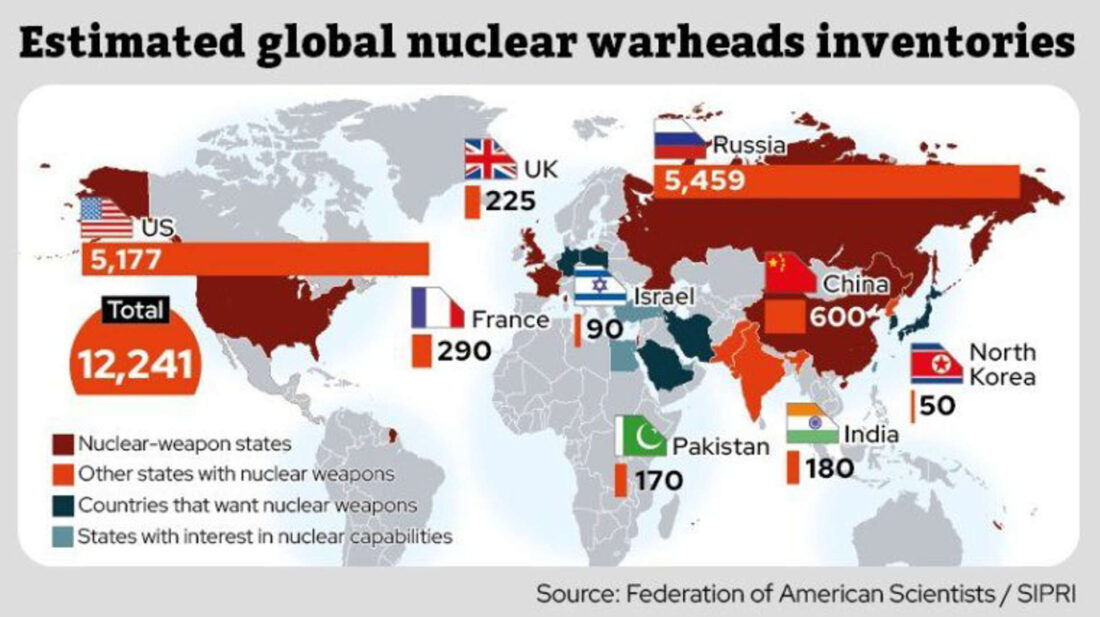
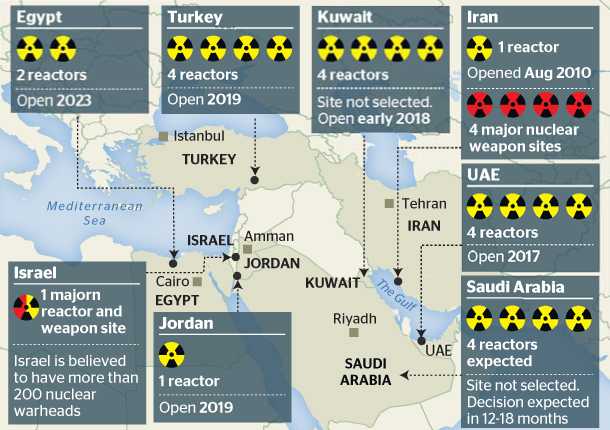 Figure 1 – Map of nuclear reactors and weapons in the Middle East (Source:
Figure 1 – Map of nuclear reactors and weapons in the Middle East (Source: 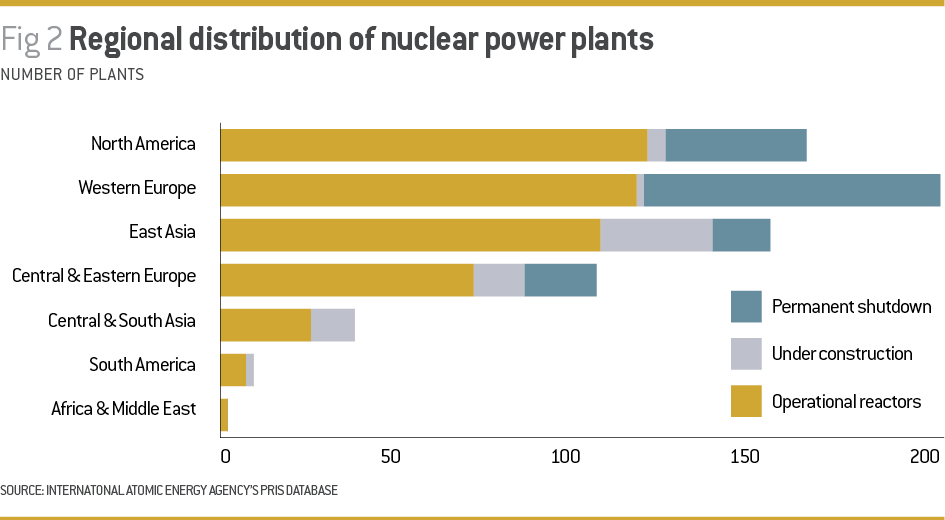
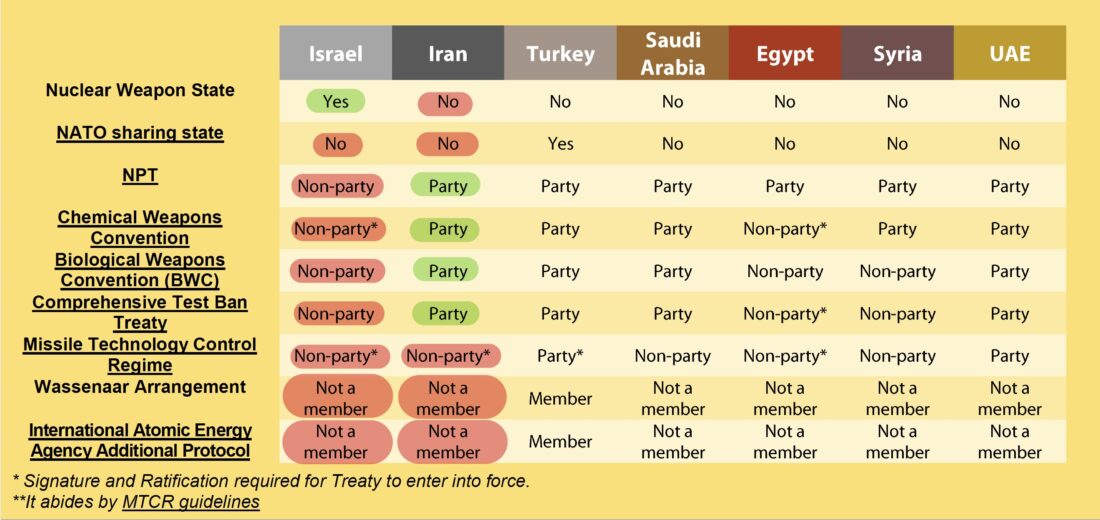
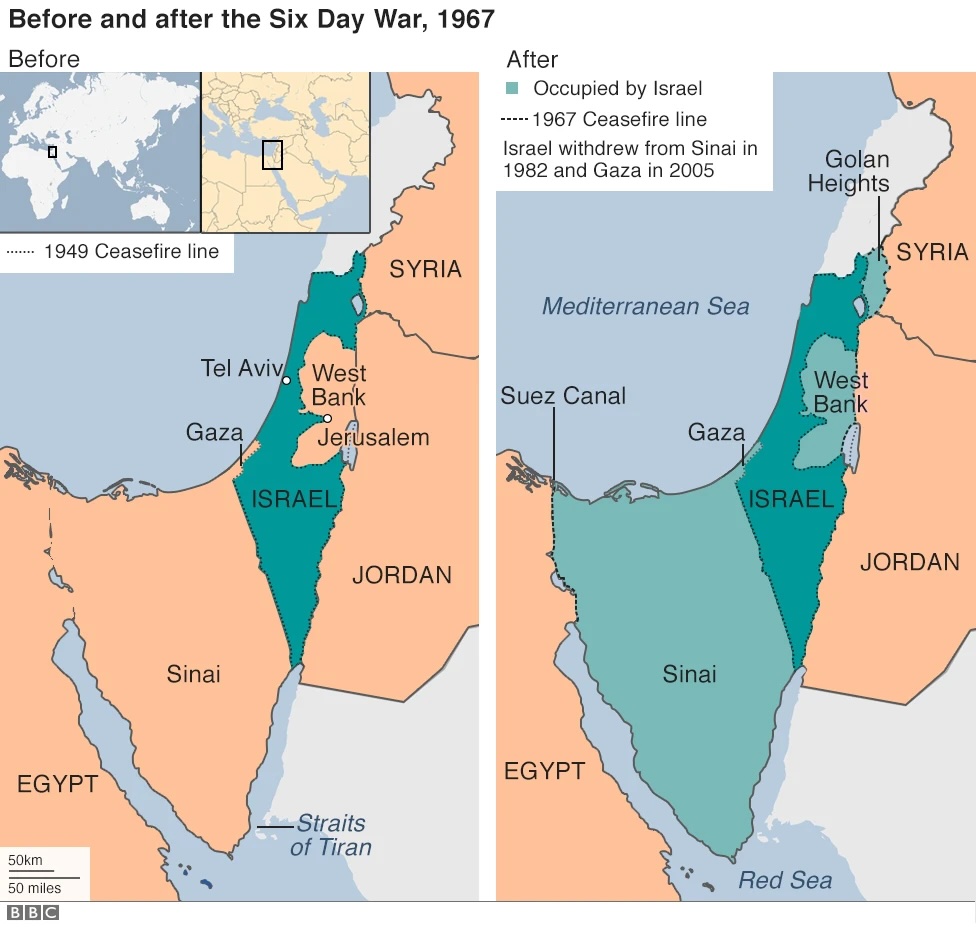 Map of the region before and after the Six-Day War (Source:
Map of the region before and after the Six-Day War (Source: 